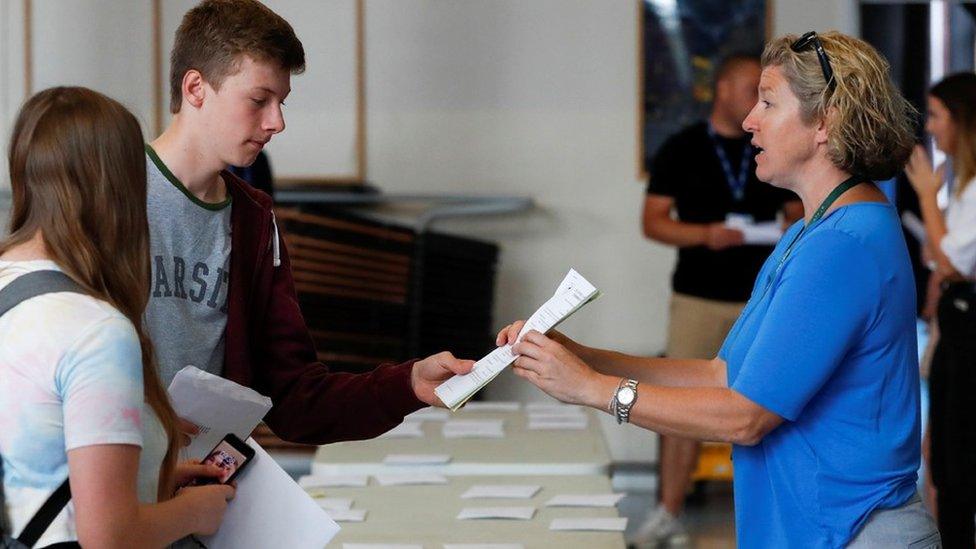A-levels: Labour call for government U-turn over 'exams fiasco'
- Published
- comments
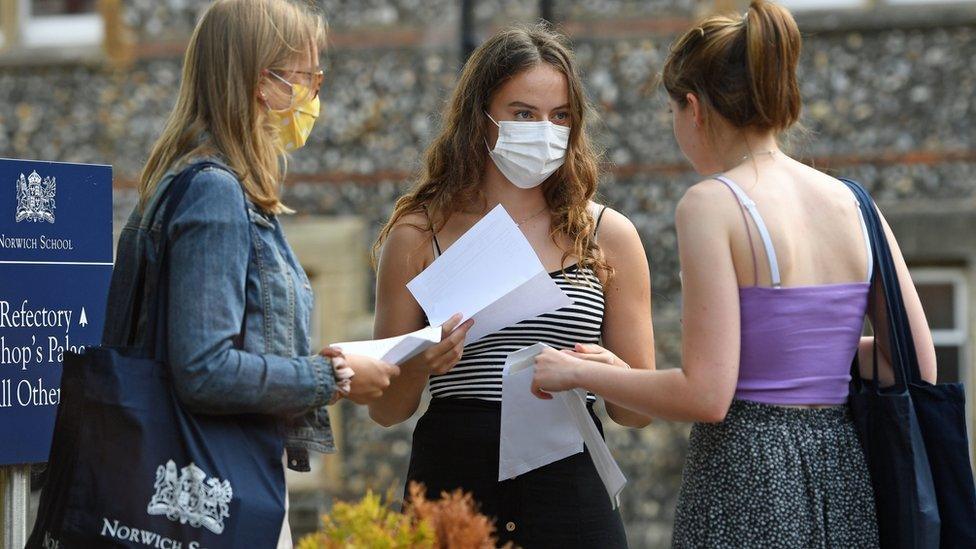
There has been widespread concern about the fairness of the 'calculated' results
Labour has called on ministers to act immediately to sort out an "exams fiasco" in England and stop thousands of A-level students being "betrayed".
It said it was unacceptable that a "flawed system" had led to 280,000 pupils having their marks downgraded.
Sir Keir Starmer said ministers must follow the lead of Scotland and allow teacher assessed marks to be accepted.
Ministers say this risks "grade inflation" and disadvantaged pupils had not been disproportionately affected.
But some Tory MPs have challenged the fairness of how grades have been decided.
Schools North East, representing over 1,100 schools in the north east of England, also backed the use of teacher assessments.
But they said if that was not possible there needed to be a much more rapid and transparent way for schools to appeal, saying that using mock grades or relying on autumn exams was inadequate.
In London a group of protestors gathered outside 10, Downing Street to express their anger at the results while petitions, calling for more weight to be given to teacher assessments, gained tens of thousands of signatures.
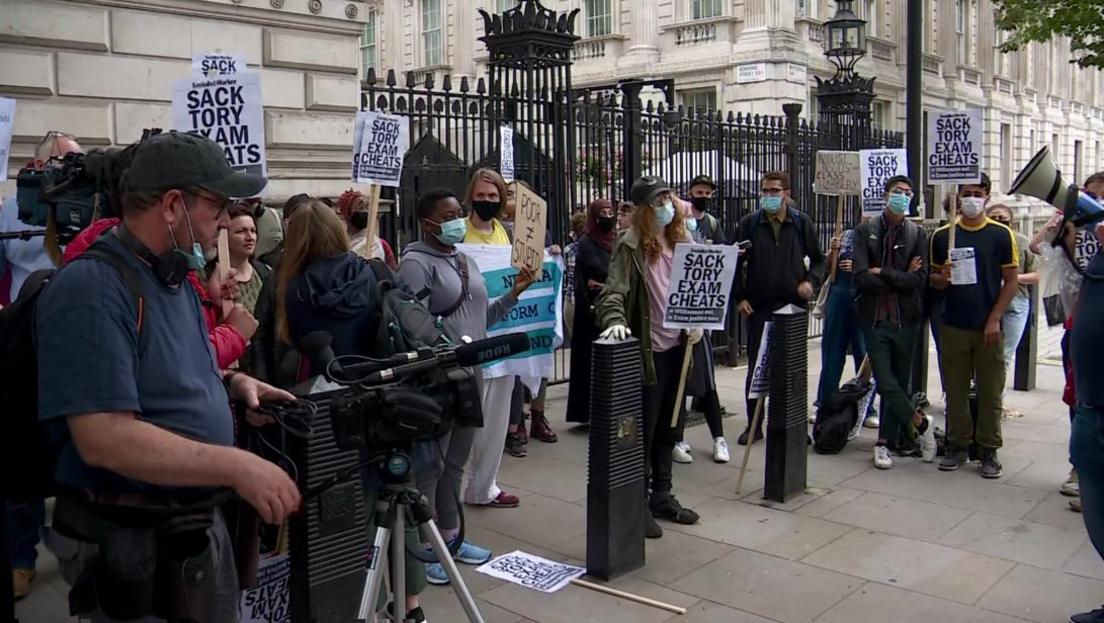
Protestors angry at the exam grading system gathered outside 10, Downing Street on Friday
After exams were cancelled due to the pandemic, grades were awarded using a controversial modelling system, with the key factors being the ranking order of pupils and the previous exam results of schools and colleges.
This produced more top grades than have ever been seen before in A-levels, with almost 28% getting A* and As, but head teachers have been angry about "unfathomable" individual injustices in the downgrading of some results.
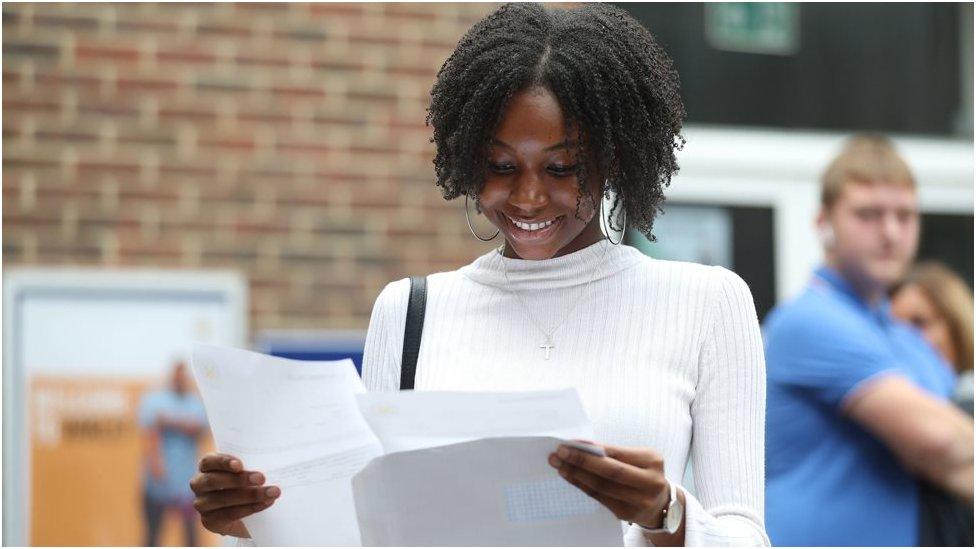
This year's A-level results are higher than even before
In England, 36% of entries had grades lower than their teacher assessments and 3% were down two grades.
There are now calls to switch away from this system and to use teacher assessments, in the way that the government U-turned in Scotland.
But England's exam watchdog Ofqual has warned that using teachers' estimates would have artificially inflated results - and would have seen about 38% of entries getting A*s and As.
'Injustice'
Labour said the lack of consistency in individual results was "heartbreaking" for those affected and the government was squarely to blame for sticking with a "fatally flawed results system".
"Across the last 24 hours the scale of the injustice has become clear," said Sir Keir.
"Young people and parents right across the country, in every town and city, feel let down and betrayed.
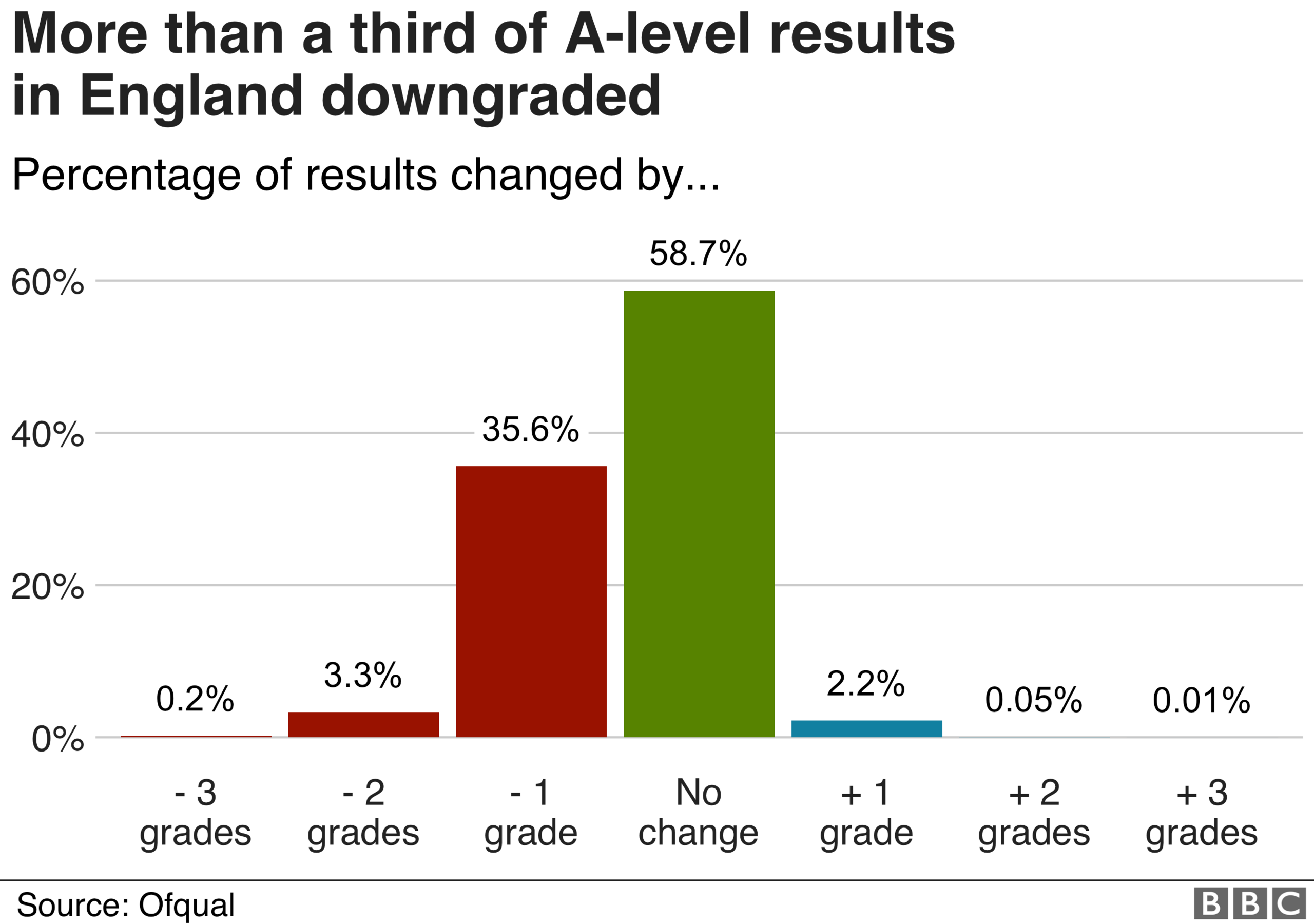
"The unprecedented and chaotic circumstances created by the UK government's mishandling of education during recent months mean that a return to teacher assessments is now the best option available," said the Labour leader.
"No young person should be at a detriment due to government incompetence."
Labour's education spokeswoman Kate Green also called for appeals to be able to be made by individual students, not only through schools.
The Equalities and Human Rights Commission has urged the exams regulator Ofqual to consider the equality impacts of all their actions and mitigate against any potential negative affect on disadvantaged and minority groups.
EHRC Chief Executive, Rebecca Hilsenrath, called on the watchdog to publish a full breakdown of the differences between teacher assessed grades and the final grade.
"Students who have been downgraded must be able to appeal directly if they believe their grades are unfair," she said.

Figures from Ofqual showed independent schools had disproportionately benefited from the rise in top grades - up by five percentage points, compared with two percentage points for comprehensives and 0.3 percentage points for further education colleges.
The chairman of the Education Select Committee, Tory MP Robert Halfon, urged Ofqual to "explain properly how their model has worked and whether it has been fair".
Mr Halfon also said exam appeals "should be no cost" to students.
Writing on his website, the former children's minister Tim Loughton said the results had been "extraordinarily distressing" for some students and urged ministers to "look at the algorithm again for those who have missed out on their place in further education".
Another, Tory MP. Robert Syms, asked the government to "go on teacher recommendation" arguing that grade inflation would be less unfair than failing students who did not have the chance to take exams.
And Conservative Peer, Lord Porter of Spalding, called the process for awarding grades "shambolic" and said it made him ashamed to be a member of the party.
Lord Porter also criticised fees for appeals which can be more than £100 for an unsuccessful appeal.
Students not deferring
Prime Minister Boris Johnson has defended what he said were a "robust set" of grades and said that pupils who believed they were treated unfairly would be able to appeal or, if they wanted, sit exams in the autumn.
Schools can appeal for an upgrade if their pupils' mock grades were higher than their allocated results.
But the exam regulator Ofqual has still to say how a mock exam result can be validated - and head teachers have warned that mocks are not standardised or taken by all pupils, and could not be used as a fair way of deciding final exam results.
Speaking on BBC Breakfast, Transport Minister Grant Shapps rejected suggestions this year's exam system had been tougher on students from poorer backgrounds.
"More students from disadvantaged backgrounds are going to university and overall we've got more accepted to university than previously as well," said Mr Shapps.
The latest figures from the Ucas admissions service do not show any significant increase in students deferring for a year.
There will still be places to be decided through clearing, but so far almost 430,000 places have been accepted.
- Published13 August 2020
- Published13 August 2020
